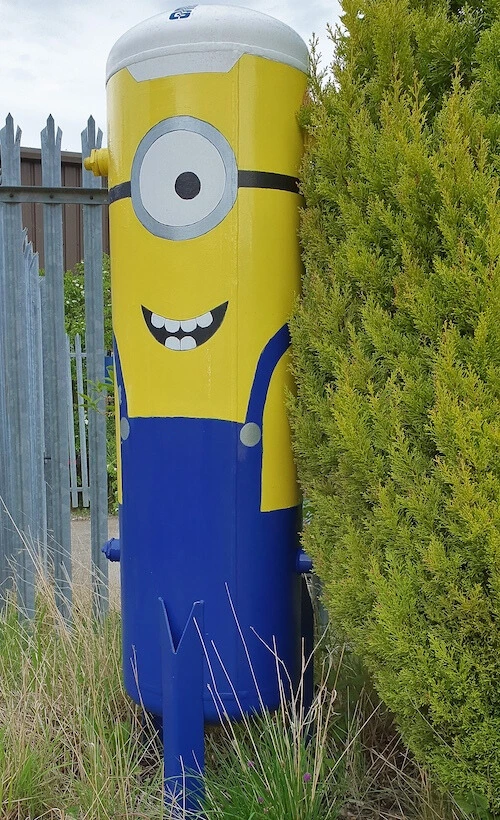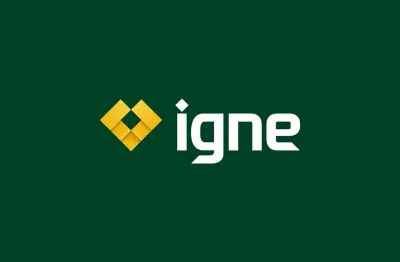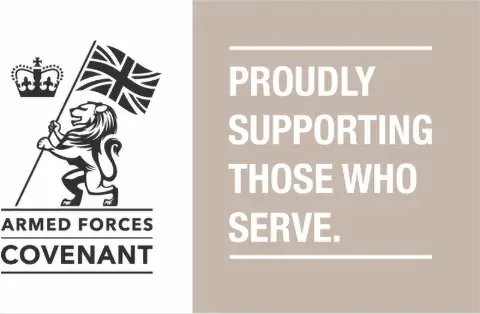Meet Nick Vater
This week, the penetrating glare of Igne’s inimitable staff spotlight is burning a hole in Nick Vater’s retinas. He tried to run, he tried to hide – and in the end, he resigned himself to the inevitable. When it’s your time to shine, the staff spotlight WILL find you.
So, apart from being Nick Vater, who actually are you?
I’m a Director of Allied Exploration & Geotechnics Limited (AEG) – which is of course now part of Igne.
I joined AEG in 1988 as a graduate geologist and worked there up to around 1995 before moving to a local authority Transport and Materials Laboratory based in Gateshead.
I was never overly motivated to transfer my skills into consultancy and the opportunity in local authority provided a good balance between the skills I’d already developed and those which I believed were essential to furthering my career.
I returned to the AEG fold in 2006 as a replacement for the outgoing Technical Director.
Apart from making Minions, (see below, dear reader), what does your job entail?
It’s multidisciplinary at its heart, being rooted in day-to-day finance, personnel and contract management together with all the loose-ends which emerge from those areas.
The days can be quite varied with the focus often shifting between technical, HSEQ and commercial depending on whether an issue has arisen in an engineering or contractual context.
Ultimately, however, my main goal is the holistic wellbeing of the business regardless of the individual area and to guide it to be the best it can be.
Who inspired you to pursue the career you have today?
There are a few people who should get the credit for that, but the die was initially cast during the sixth form at school by Chris Evans, a geology teacher. The world needs more teachers like Chris, wholly enthusiastic about the subject he taught, fully committed to the challenge of empowering learning and academic development, as well as supportive to the students without compromise.
It never fails to astound me that moments change lives and aspirations, a few simple words spoken at the right time can make all the difference in the path followed. His dedication was so inspirational that when I became chartered, I felt personally obliged to write to him to let him know how instrumental he was to my career and to pass on the appreciation I held for all the effort he applied.
Sport and mischief were my primary focus areas at school, but he saw past this whilst other teachers just worked their hours. He phoned me a few nights later, he was so proud, which ultimately moved me tears.
After qualifying at Sunderland Polytechnic (now University) the next major influence was Hamid Rowshanaei, the then Technical Director of the fledgling AEG back in 1988, who steered and mentored me throughout my geotechnical formative years – I had no idea what “Site Investigation” was when I started.
We became close friends, and he helped broaden my horizons in so many ways and directed me from a technical standpoint. Then at a later point, on my return to AEG in 2005, Keith Peacock guided me in all things management. He had the ability to challenge me, had faith in my abilities and helped fortify the importance of a strong moral compass; doing what’s right when it was necessary to do so.
It was Keith who saw the Managing Director in me and was supportive when the transition finally occurred. Having standout people like these in life makes all the difference and these few good souls have transferred that aspirational residue to me also.
What advice can you give someone who wants to follow in your career footsteps?
If you want to achieve something, whatever that something is in life or career, my key is advice is the wholehearted application of effort and drive - there is no real substitute to this investment, and it will be needed to get you through the difficulties ahead.
I would recommend a career in ground investigation contracting, it has been beneficial to me, but it does take particular characteristics and being on site 80% of the time for the first 10 years represents an immediate challenge. You have to be motivated, as the time spent to financial reward ratio isn’t perfect, at least to start with.
Kinship and respect with those around and supporting you are important factors, where the typical office positioning between colleagues and friends becomes immaterial – the people you work with become mates, others more like family. I think what I’m trying to get across is that you have to be prepared to go “all in” and make the commitment.
I didn’t come from the strongest academic background, nor was I born with the proverbial silver spoon inserted in my mouth. You make the most of what you have, enjoy the journey regardless of the challenges presented, grow from your experiences, and don’t be too blinkered in terms of limiting your interests.
What is a tough challenge you’ve overcome at work?
This is related to the business, and the unprecedented circumstances that COVID brought to bear. I had only stepped into the Managing Directors role a few months before, and the thought of a UK wide shut-down filled me with dread - a true baptism of fire as some would say.
Hope, however, is never too far away. The employees pulled it out of the bag in April finishing as much work that it was possible to complete, and the finance and contract teams made sure that we invoiced everything we could.
Although, the business was forced to shut down in May, a skeleton staff ensured that reports, tenders and invoices were submitted.
We applied safe working practice and had the procedures in place – split shifts in the office to keep numbers down, together with distancing protocols etc., ready for when the business started up again, in June.
The site teams played a massive part, by agreeing to the new operational requirements and understanding why we were working (being part of the construction industry) whilst the rest of the UK remained in lock-down.
We gained a great deal of admiration from essential services providers like UU and NWL, amongst others, who relied on us during this period. Looking back on it now, I’m not sure how I coped with the pressure, but it is acknowledged that such couldn’t be achieved without the support of all within the business.
What about a triumph or a career highlight?
How long have I got?
As long as there’s money in the meter, the light will keep shining on you Nick – have at it…
There have been many highlights, but the one which resonates strongest relates to the conclusion to the first year teaching the Ground Investigation module at Newcastle University. I gave a spontaneous speech to about 50 or so students about the rigours of site investigation at Balderhead Dam (in County Durham), which covered for the lack of site operations, as the start was delayed, so improvisation was necessary. I spoke from the heart and tried to convey my passion for ground investigation and its pitfalls.
Admittedly it was an indulgent moment, but the students responded in kind and clapped enthusiastically at the end. Kostas Tsiminis was part of the crowd that day, maybe he can provide his thoughts on the experience.* At the end of the final lecture, I was again humbled by a standing ovation and some of the best feedback from students that the course had received.
The support technician commented that he’d never seen anything like it during his time at the University. The marking of 50 projects over the course of four days, however, somewhat brought me down to earth.
The other career highlight was becoming Managing Director of Allied Exploration & Geotechnics Limited, by far one of my proudest moments and knowing that I had the support of employees.
That was almost too intense - give us an anecdote!
For all budding site supervisors, don’t underestimate the wiliness of cows. All drilling grease should be secured; leave the tin open overnight and the contents will be consumed. In fact, anything you leave out and not fenced away will be covered by a thick coating of cow mucus come the morning.
A drilling rig in a field is to cows the equivalent of a fun fair attraction to small children!
One time on site, some cows escaped an enclosure - they expertly exploited a weakness we had made in the fence line to gain access to a field and saw their chance for freedom. They just literally sneaked out, leaving us at a loss to where they had all gone.
It was a warm day, and it took the best part of the afternoon frantically running around to find them, gather them together and coax them back to the safety of the field.
On a Department of Transport contact in the midlands, a concerned resident enquired why we were drilling holes in his neighbourhood, one helpful driller introduced himself to the conversation abruptly and explained to the concerned resident that there was going to be a new road – and it was going straight through the nearby collection of dwellings…
The concerned resident went immediately pale and hurried away shouting “I live in that house, and we’ll see about this!” There was quite some fallout - and the lesson to learn is regardless of how amusing something may sound in your head, sometimes it’s better to keep the joke to yourself.
Minion mention please...
Oh well, that was one of those things that crept up quietly, painted in stolen lunch breaks and touched up with a bit of rogue welding here and there. The lab team had taken an old air vessel – usually just a workhorse piece of an air compressor – and transformed it into a life-sized minion, complete with little legs.
I had no clue at first; they’d kept it under wraps, like a covert operation in creativity. When I finally got wind of it, I couldn’t help but be impressed. They’d turned an industrial cast-off into a quirky, delightful garden guardian, positioned near the gates where it surprised everyone who walked by.
It’s really not my story to tell because the whole idea, the work, and the execution was the lab team's – they deserve all the credit, no question about it. In fact, they deserve glowing credit, maybe you could put the entire team under the spotlight? Because, this “minion” might divide opinion with outsiders, but it symbolises the lab team. They’re a group that sometimes goes unseen in their contributions, but they’re a tight-knit crew who always deliver and can even surprise with their creativity.

Apart from marketing, obviously, who or what motivates you at work and why?
This is a relatively easy question to answer. It all boils down to the people I work with; their input into my day should be just as important as my contribution is to theirs.
Having challenging work is an important factor, it’s good to have a sense of achievement when the pieces fall successfully into place, it’s the stuff that essentially sustains me, and I’m at my lowest ebb when such is elusive.
Besides that, most managerial difficulties are related to the pursuit of common ground and making a difference regardless of the circumstances or its characteristic (big, small or seemingly insignificant). So, it’s making a difference and a sense of achievement that motivates me the most - oh, and like the physicist Richard Feynman suggested, also the pleasure of finding things out.
In terms of successes, which accomplishment are you most proud of?
Again, there are many both personal and professional. I’ll stick to the latter in the context of this question which doesn’t undervalue any of the family, or more private related accomplishments in the former. They are all proud moments, but to be indulgent again - going back to university in my late 30s to complete an MSc and righting a previous “poor show” at the conclusion of my first degree was important to me personally.
I find It’s difficult to walk away from something where you know you should have performed better, tried harder, given more. The BSc left me with unfinished business a collection of “what ifs” which were unresolvable and a less than satisfactory outcome. I felt a debt to my parents as well as myself.
I signed onto a part-funded MSc, juggled my way through the difficulties of work and having a young family and after four years, concluded the academic process by gaining a distinction in environmental engineering.
I still harbour this outrageous notion of completing a Ph.D., so who knows?
How have you grown professionally in your time at Igne?
I have grown during my time at Igne, and I have enjoyed the experience. It has brought a host of different challenges to the table.
Tell us something about you that most people don’t know.
My nickname on the rugby pitch was “Darth” after Mr. Vader from the original Star Wars Trilogy whose name has a certain similarity to mine!
I have 3 electronic synthesiser instruments even though I’m far from a musician and spend a number of hours during the weekends arranging music which is by and large only fit for a Travelodge elevator. I get plenty of enjoyment in the process and I have a back catalogue of tracks, again in the broadest sense, which range from pop/rock to spoken pieces – mainly monologues from films or famous speeches.
My wife prefers the dividing door shut most of the time.
* In Kostas' own words: "Coming to the UK to study for my MSc was not just challenging in terms of modules, workload or adapting to the language. More than anything, it was challenging to find a field in which I’d find some enthusiasm in myself, somewhere where I’d feel motivated and encouraged to dive into, a place to call my own. Nick Vater gave me everything I had hoped for that day. His speeches are a bit lengthy, I know, but full of substance, encouragement, and the will to transmit his endless knowledge and experience to the new generation. His character was laid out in front of us, nothing to hide and no feelings restrained, and that is exactly what made me love the field of ground investigation. I always thought I’d struggle to find a home, Nick offered me one in the space of a single site visit without even knowing. You may notice that from the smirk on my face on the picture, hoodie beneath the hardhat (I was feeling as cold outside then as I do now) but suddenly filled with ambition and the will to dive deeper into my field of science. One phrase I remember from that day, at the end of the site demonstration Nick said: “This may not be the easiest or cleanest field of science to dive into, but it’s a bloody interesting one!”. How can you not get a standing ovation after that! Every one of the students on that class still remembers Nick (I still keep in touch with many of them!), and to date I've not heard a bad thing about him, common trait only of those who inspire and encourage, and one that I'd be proud to one day achieve as well."
Other articles of interest

Igne launch
Igne launch sees transformative merger of six leading companies to reshape pre-construction services in the infrastructure, energy and water sectors.

Igne signs Armed Forces Covenant
This is a proud week for us at Igne as our Director of UXO, Lucie Tiverrier, has signed the Armed Forces Covenant.


